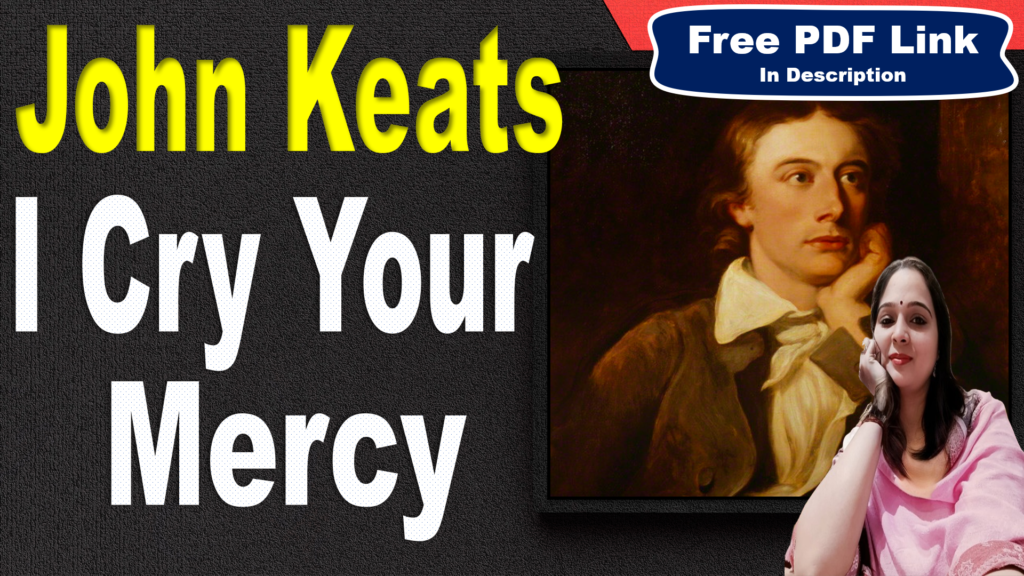
I Cry Your Mercy Pity Love Questions and Answers
Very Short Answer Questions
Who is the poet of “I Cry Your Mercy—Pity—Love!—Aye, Love!”?
John Keats.
What is the speaker asking for in the poem?
The speaker is pleading for complete and unreserved love.
What type of love does the speaker desire?
A pure, guileless, and merciful love.
What does “without a blot” mean in the poem?
It means a love that is flawless and free from deception.
What poetic form is used in the poem?
The poem is a Shakespearean sonnet.
What is the rhyme scheme of the poem?
ABAB CDCD EFEF GG.
How does the speaker describe the beloved’s eyes?
As “divine.”
What does the speaker mean by “atom’s atom”?
Even the tiniest part of love should not be withheld.
What does the speaker fear if he doesn’t receive full love?
He fears death or living as a “wretched thrall.”
What would happen to the speaker’s ambition without love?
His ambition would become “blind.”
How does the speaker describe the feeling of losing life’s meaning?
As a “mist of idle misery.”
What sensory imagery is used in “the palate of my mind / Losing its gust”?
The imagery of taste to signify a loss of mental satisfaction.
What tone is used throughout the poem?
Passionate and desperate.
What does the word “thrall” imply in the poem?
It implies being a slave or completely dominated by someone.
What theme is central to the poem?
The theme of longing for a complete and consuming love.
What Romantic ideal does the poem embody?
The pursuit of a deep, transcendent love.
Why does the speaker feel dependent on his beloved?
Because he believes her love gives his life purpose.
What literary device is used in “million-pleasured breast”?
Hyperbole, to emphasize the joy his beloved provides.
What does the speaker mean by “Life’s purposes”?
His goals and ambitions, which he feels are tied to his beloved’s love.
What would the speaker’s life become without love, according to the final lines?
A purposeless existence, with ambition and joy dulled.
Short Answer Questions
What does the speaker mean by “merciful love that tantalizes not” in the poem?
The speaker desires a love that is merciful and doesn’t tease or frustrate him. He wants a love that is steady, constant, and genuine, without any element of game-playing or elusiveness. This phrase emphasizes his longing for an unconditional, committed love that brings him peace and fulfillment rather than anguish.
How does the speaker view partial or incomplete love in the poem?
The speaker views partial love as unbearable and devastating. He pleads with his beloved to give herself entirely, fearing that if she withholds even the smallest part of her affection, he will either die or live in a state of miserable servitude. To him, only a complete, undivided love can provide him with the joy and meaning he seeks.
Why does the speaker use the phrase “atom’s atom” in his plea?
By using “atom’s atom,” the speaker highlights his need for his beloved’s complete and total devotion. It suggests that even the tiniest fragment of love withheld would be unbearable to him. This metaphor reflects his desire for a love so profound that no part of his beloved is held back.
How does Keats use imagery to convey the beloved’s beauty in the poem?
Keats uses vivid, sensory imagery to describe his beloved, painting a picture of physical and emotional allure. Phrases like “warm, white, lucent, million-pleasured breast” emphasize her physical warmth and radiance, while “those hands, those eyes divine” suggest a heavenly, almost divine beauty that captivates the speaker’s heart.
What is the effect of the repeated plea “all—all—be mine” in the poem?
The repetition of “all—all—be mine” conveys the speaker’s intense desperation for complete love. It reflects his yearning for an all-encompassing connection that leaves nothing behind. This insistence underscores the depth of his need, giving the poem a sense of urgency and emotional intensity.
What does the speaker fear if he cannot achieve his ideal love?
The speaker fears that without complete love, his life would become hollow and purposeless. He imagines either dying or living as a “wretched thrall,” enslaved by unfulfilled longing. Without this love, he predicts that he will lose his zest for life, descending into “idle misery” and aimless existence.
How does the poem reflect Romantic ideals?
The poem reflects Romantic ideals through its focus on intense emotion, individual desire, and the pursuit of transcendental love. Keats emphasizes the beauty, depth, and spiritual significance of love, valuing it as essential to a meaningful life. The speaker’s yearning for an absolute, soul-deep connection embodies the Romantic fascination with passion and emotional authenticity.
What is the significance of the metaphor “the palate of my mind / Losing its gust”?
This metaphor suggests that, without love, the speaker would lose his enjoyment and appreciation for life, much like food loses its taste for someone in despair. It implies that love is what gives his life flavor, satisfaction, and meaning, and without it, his mental and emotional vitality would fade.
How does Keats use personification in the poem?
Keats personifies love by describing it as “merciful” and “never-wandering,” giving it human qualities like constancy and kindness. This personification elevates love to an active force that can either fulfill or devastate the speaker. The speaker’s ambition is also described as “blind,” further personifying his dreams as something that would lose direction without love.
What message does the poem convey about the nature of love and fulfillment?
The poem conveys that true fulfillment in life comes from an unreserved, all-encompassing love. The speaker believes that without total commitment from his beloved, his life will lose meaning, ambition, and joy. Keats suggests that love is not just an emotion but a vital force that gives purpose, satisfaction, and direction, and without it, one risks falling into despair and emptiness.





